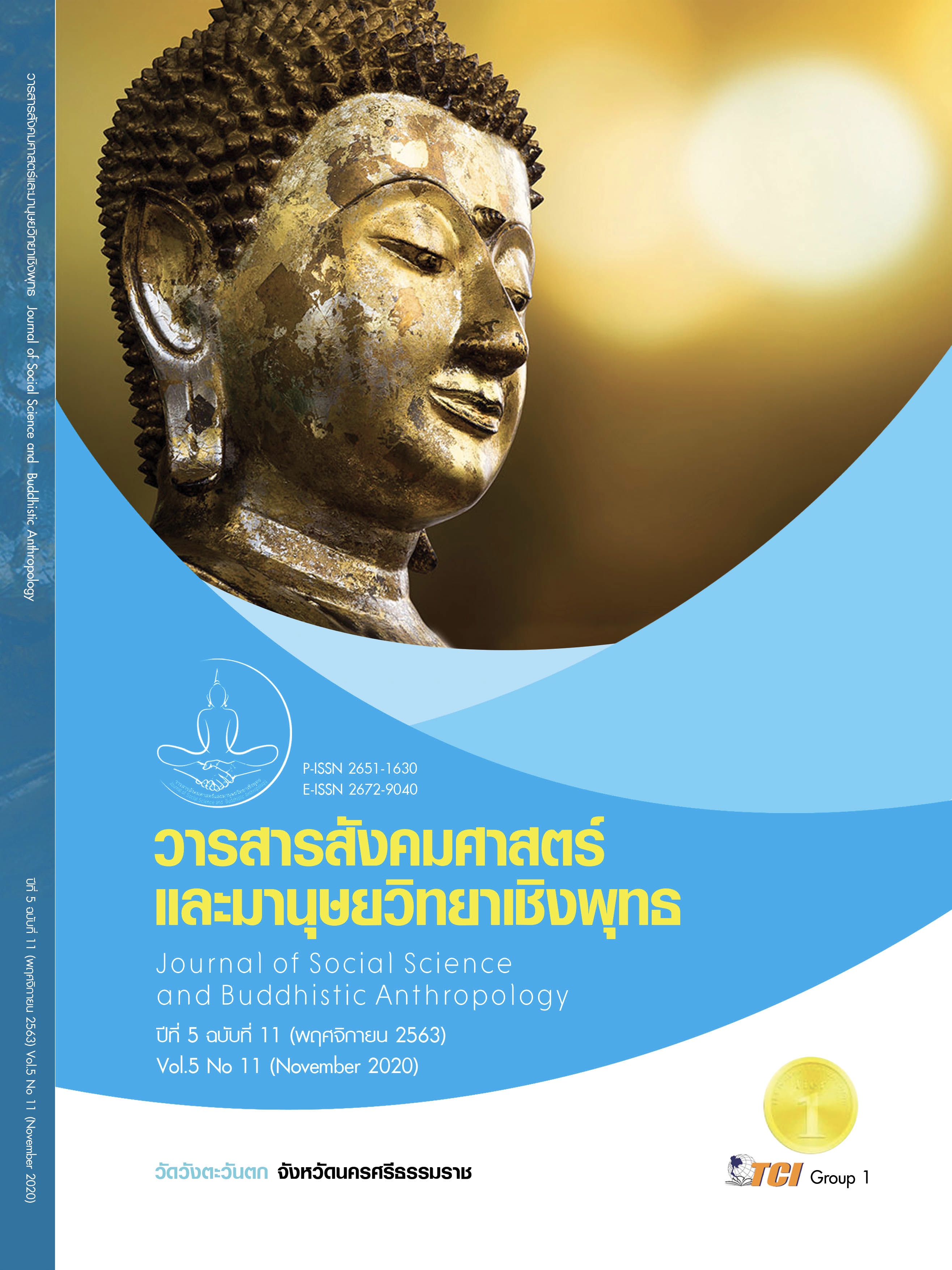LEARNING MANAGEMENT THROUGH THE VALUES CLARIFICATION PROCESS COMBINING THE CONCEPT OF CONTRACT SYSTEMS TO DEVELOP RESPONSIBILITY CHARACTERISTICS OF GRADUATE DIPLOMA PROGRAM OF TEACHING PROFESSION STUDENTS IN THE MORAL, ETHICS, AND PROFESSIONAL ETHICS COURSE
Keywords:
Learning Management, Responsibility Characteristics, Values Clarification Process, Contract SystemAbstract
The Objectives of this research article were to 1)develop learning management through the process of values clarification combining the concept of contract systems to develop responsibility characteristics of students in the graduate diploma program of teaching profession, and 2) study the result of using learning management through the process of values clarification combining the concept of contract systems to develop responsibility characteristics of students in the graduate diploma program of teaching profession. The samples were 58 graduate diploma program of teaching profession students which studied the moral, ethics, and professional ethics course, Faculty of Technical Education, Rajamangala University of Technology Thanyaburi in the first semester of the academic year 2019. The samples were selected by purposive sampling. The research instruments consisted of: 1) learning management lesson plans of learning management through the process of values clarification combining the concept of contract systems and learning management lesson plans through traditional model, 2) the responsibility evaluation form which has reliability score 0.93 and discrimination score between 0.28 - 0.84. 3) the satisfaction assessment form for assess the learning management through the process of values clarification combining the concept of contract systems. The statistics used for data analysis were percentage, mean, standard deviation and hypothesis testing by using the t-test. The results of the study revealed that: 1) learning management through the process of values clarification combining the concept of contract systems was at a highest level of appropriateness, and 2) the results of using learning management were responsibility characteristics of students that learn by learning management through the process of values clarification combining the concept of contract systems were higher than students that studied by learning management through traditional model with statistical significance at the level of .05 and 3) the satisfaction of students towards learning management through the process of values clarification combining the concept of contract systems found the satisfaction was at a high level.
References
จินตนา วิไลชนม์ และประสาท เนืองเฉลิม. (2561). การพัฒนาการจัดการเรียนรู้เพื่อส่งเสริมความรับผิดชอบต่อสังคมโดยใช้กระบวนการกระจ่างค่านิยม สําหรับนักเรียนชั้นประถมศึกษาปีที่ 5. วารสารศึกษาศาสตร์ มหาวิทยาลัยมหาสารคาม, 12(1), 73-82.
เติมศักดิ์ สุขวิบูลย์. (2563). ข้อคำนึงในการสร้างเครื่องมือประเภทมาตรประมาณค่า (Rating Scale) เพื่องานวิจัย. เรียกใช้เมื่อ 13 มีนาคม 2563 จาก https://www.google.com/ url?sa=t&rc t=j&q=&esrc =s&source=web&cd=&ved=2ahUKEwik056 WgszrAhUgIbcAHZGZCsEQFjAMegQIBBAB&url=https%3A%2F%2Fwww.ms.src.ku.ac.th%2Fschedule%2FFiles%2F2553%2FOct%2F1217086.doc&usg=AOvVaw14u6Qd6LLhff9Crh1ZaR62
ทิศนา แขมมณี. (2560). รูปแบบการเรียนการสอน. กรุงเทพมหานคร: จุฬาลงกรณ์มหาวิทยาลัย.
ยุรวัฒน์ คล้ายมงคล. (2561). การพัฒนารูปแบบการจัดการเรียนการสอนเพื่อพัฒนาคุณลักษณะบัณฑิตที่พึงประสงค์เรื่องสุขภาวะโดยประยุกต์ใช้ระบบคู่สัญญากับแนวคิด PDCA และ education 3.0. วารสารครุศาสตร์ จุฬาลงกรณ์มหาวิทยาลัย, 46(3), 174-193.
สกล สุขสวัสดิ์ และมนัสนันท์ น้ำสมบูรณ์. (2560). การพัฒนาค่านิยม ความรักชาติ ศาสนา และ พระมหากษัตริย์ที่จัดการเรียนรู้ด้วย กระบวนการกระจ่างค่านิยม ของนักเรียนชั้นมัธยมศึกษาปีที่ 5. วารสารมหาวิทยาลัยศิลปากร (ฉบัภาษาไทย) สาขามนุษยศาสตร์ สังคมศาสตร์ และศิลปะ, 10(2), 1040-1059.
สำนักงานเลขาธิการคุรุสภา. (2558). ข้อบังคับคุรุสภา ว่าด้วยจรรยาบรรณของวิชาชีพ พ.ศ. 2556. กรุงเทพมหานคร: สำนักงานเลขาธิการคุรุสภา.
สำนักส่งเสริมวิชาการและงานทะเบียน. (2561). ผลการเรียนรายวิชา 02143602 คุณธรรม จริยธรรม และ จรรยาบรรณวิชาชีพครู. ปทุมธานี: สำนักส่งเสริมวิชาการและงานทะเบียน มหาวิทยาลัยเทคโนโลยีราชมงคลธัญบุรี.
หลักสูตรประกาศนียบัตรบัณฑิตสาขาวิชาชีพครู-ฉบับปรับปรุง 2560. (2560). เอกสารหลักสูตรรายวิชา คุณธรรมจริยธรรม และจรรยาบรรณวิชาชีพครู. ปทุมธานี: มหาวิทยาลัยเทคโนโลยีราชมงคลธัญบุรี.
Justin, M.P. & Suganya, D. (2016). Values Clarification In Education. National Conference on “Value Education Through Teacher Education”, 1(2), 2395 - 2396.
Kirschenbaum, H. (2013). Values Clarification in Counseling and Psychotherapy: Practical Strategies for Individual and Group Settings. Retrieved March 15, 2020, from https://oxford.universitypressscholarship.com/view/10.1093 /acprof:oso/9780198293309.001.0001/acprof-9780198293309-chapter-8?print=pdf
Lisievicia, P. & Andronieb, M. (2016). assessing the effectiveness of values clarification techniques in moral education. in Future Academy’s Multidisciplinary Conference 2016. Future Academy’s Multidisciplinary Conference.
Miller, M. (2020). Teaching and Learning in Affective Domain. Retrieved March 15, 2020, from http://epltt.coe.uga.edu/
Polit, D. F. & Beck, C.T. (2012). Nursing research: Generating and assessing evidence for nursing practice. Philadelphia: Lippincott Williams& Wilkins.
Raths, L. E., et al. (1966). Values and Teaching. Columbus: Merrill Publishing Company.
Simon, S.B. et al. (2009). Values Clarification: A Practical, Action – Directed Workbook. New York: Hachette Book Group.
Wilma, S. R. (2019). Values Clarification Approach Approaches and Strategies in Teaching Values Education The National Center for Teacher Education. Manila : Philippine: Normal University.









